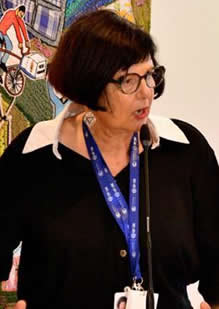Minister’s remarks on the Paper Manufactures Association of South Africa (PAMSA) Nature based Solutions Event at SA Pavilion UNFCCC COP 28
09 December 2023
Honorable Ministers
Ambassador Jose Carlos
Distinguished Delegates
Ladies and Gentlemen
It is my pleasure and honour to be part of to this important event.
Biodiversity and ecosystems are crucial for society and human existence. Healthy and functional ecosystems are crucial for the provision of ecosystem services that benefit human culture, well-being health, quality of life, drive economic activity and can help us to adapt to climate change.
However, we also know that climate change is ranked amongst the major drivers of ecological change and is also expected to exacerbate the existing threats to biodiversity and ecosystem services. This will debilitate the ability of nature and ecosystems in helping people to mitigate and adapt to climate change at local, national, regional and global levels.
As a result, urgent action is required noting that biodiversity is currently declining at the fasted rate observed in human history with over one million plant and animal species now threatened with extinction.
Ladies and gentlemen, the adoption of Kunming-Montreal Global Biodiversity Framework (KM-GBF) occurred at a very important time to stem the loss of biodiversity to secure our own health and well-being alongside that of the planet. In addition, the framework provides concrete measures to address biodiversity loss and restore ecosystems for current and future generations. Furthermore, together with the Paris Agreement, it paves the way towards a climate-neutral, nature-positive, and resilient world by 2050 (and beyond).
South Africa is ranked amongst the most biodiverse countries in the world. However, like many other countries, South Africa’s biodiversity is under immense pressure from the commonly known global change challenges that include climate change. Given the latter, the development and effective implementation of policies aimed at addressing biodiversity loss and other measures, is therefore crucial to guide government, the private sector, and traditional and indigenous communities, in conservation and sustainable use of South Africa’s biodiversity.
In this regard, subsequent to the adoption of the GBF, South Africa adopted the White Paper on Conservation and Sustainable Use of South Africa’s Biodiversity.The White Paper provides overarching policy guidance for conservation, sustainable use, and fair and equitable access and benefit sharing of South Africa’s biodiversity, while contributing to the transformation of society, the well-being of people and nature, and to the prosperity of society.
South Africa will implement the GBF through the four goals of the White Paper thereby contributing to all the KM-GBF targets but more importantly Target 2 (Restoration of Ecosystems), Target 3 (30x30, i.e. conservation of terrestrial and marine ecosystems) and Target 8 (implementation of measures to minimise the impacts of climate change). Targets 3 underpins the implementation of the White Paper, supported by the respective goals of the White Paper that will contribute to all targets of the GBF. This will set the country on a strong path of sustainable development, considering the historical, socio-economic, and environmental context of South Africa, including the aspirations and needs of its people.
Furthermore, there are several policies and strategies in place that are supporting the use of biodiversity to help communities adapt to the impacts of climate change through Ecosystem based Adaptation (EbA).In South Arica, EbA is recognised for its potential to support poor and rural communities who are more directly dependent on natural resources and ecosystem services in adapting to climate change. The co-benefits of EbA contribute towards a broader set of socio-economic and development goals, including job creation, poverty reduction and rural/peri-urban development. In addition, EbA can be applied on diverse land and seascapes, including natural areas, human modified landscapes such as agricultural areas and urban regions. The benefits of implementation EbA include multiple social, economic and cultural co-benefits for local communities, contribution to the conservation and sustainable use of biodiversity, contribution to climate change mitigation, by conserving carbon stocks, reducing emissions caused by ecosystem degradation and loss, or enhancing carbon stocks.
Ladies and gentlemen, South Africa also recognises the potential for nature-based solutions (NbS) in contributing towards adaptation to climate change, for nature and its contributions to people. By enhancing ecosystem adaptive capacity, nature-based solutions can also reduce exacerbation of climate change driven by ecosystem changes. NbS also provides opportunities to align and cohere multiple climate response options across sectors and at multiple governance scales in South Africa, including bringing together mitigation and adaptation options.
With the concept of NbS relatively new, substantial knowledge gaps persist, including how to overcome barriers to implementation such as quantitative evidence on the benefits of NbS, especially in developing country contexts and with regard to evidence of cost-effectiveness. It is precisely the reason why South Africa is working hard together with other countries under the ambit of United Nations Environment Programme to develop guidelines/criteria aimed at guiding the design and implementation of appropriate nature based solutions.The aim here is to ensure that that nature based solutions will be both impactful and beneficial to the people and nature.
It should also be noted that cost effectiveness and societal desirability of actions to increase adaptive capacity by implementing nature-based solutions vary in time and space and there are examples of both win-win and lose-lose for biodiversity and climate.
Therefore, South Africa’s experience in developing guidelines in Ecosystem-based Adaptation provides a strong foundation to develop nationally and regionally relevant policy to optimise opportunities and reduce the risks identified of inappropriate NbS implementation.
In conclusion Ladies and gentlemen, I would like to emphasize that we are all responsible for biodiversity conservation and the sustainable use of natural resources. Working together we can do more, success in this regard is in our hands as the custodians of nature.
I thank you


